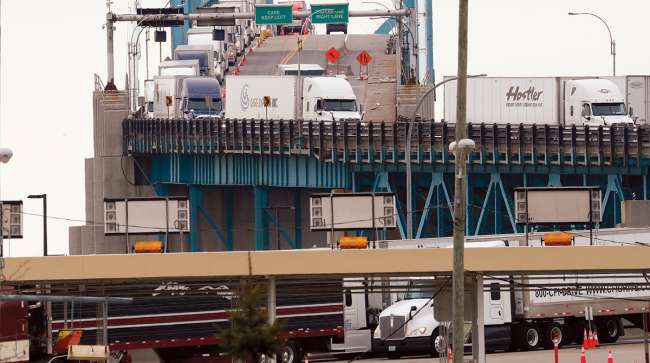Tariffs and trade agreements play pivotal roles in shaping cross-border commerce. This article delves into the implications of the United States-Mexico-Canada Agreement (USMCA) and how it has secured exemptions for a substantial portion of goods traded between Canada and Mexico.
The Landscape of Tariffs Under USMCA
In recent developments, the increase in tariffs on Canadian goods raised serious concerns among traders and economists alike. However, a significant aspect of the USMCA is its protective umbrella for most goods that comply with its regulations. This agreement, initially negotiated during previous administrations, continues to provide a robust structure for trade relations.
Exemption Details for Canadian Goods
Recent reports indicate that nearly 100% of energy exports and approximately 95% of other exports from Canada adhere to the standards set by the USMCA, providing significant tariff protections. Notably, estimates suggest that an impressive 90% of Canadian exports accessed the U.S. marketplace duty-free in the initial months following the tariffs’ implementation.
The Royal Bank of Canada reported this favorable trend, emphasizing that the average tariff rate on Canadian goods remains considerably low, with over 85% of Canada-U.S. trade occurring tariff-free. This positioning benefits not only Canadian businesses but also American manufacturers that rely on Canadian imports, fostering a mutually beneficial economic environment.
Mexican Trade Dynamics and Challenges
Turning our gaze southward, Mexico’s trade framework does not fare poorly either. Recent communications from U.S. officials announced a 90-day negotiation period, hinting at potential changes in the current tariff landscape. Existing tariffs stand at 25%, down from previous threats of up to 30%. However, it’s crucial to note that these rates apply selectively to a marginal portion of trade not covered under the USMCA.
Despite lingering uncertainties, President Claudia Sheinbaum highlighted Mexico’s advantageous position within the USMCA framework, asserting that trade terms within the agreement remain largely tariff-free aside from a few exceptions, such as automobiles and steel. Economy Secretary Marcelo Ebrard reinforced this by stating that over 84% of Mexico’s trade with the U.S. occurs without any tariffs.
The Role of Resilience in the Canadian Economy
Reflecting on the current economic climate, experts suggest that Canada’s trade resilience is commendable. Flavio Volpe, president of the Automotive Parts Manufacturers’ Association, noted that while high tariffs may appear alarming, the practicality of USMCA allows for necessary access to critical supplies. This underscores a sense of stability that many Canadian industries value deeply amidst trade negotiations.
Canada’s historical connection to the U.S. market puts it in a favorable light during negotiations, making a compelling case for the continued significance of the trade agreement. As John Manley, a former Canadian cabinet member, elucidated, a loss of the USMCA could trigger unmanageable disruptions, exacerbating challenges faced by sectors such as automobiles, steel, and aluminum.
Potential Implications for Global Logistics
So, how does this all tie back into logistics? The USMCA’s provisions to maintain a largely tariff-free trade environment can significantly streamline transportation and freight logistics within North America. Businesses engaged in moving goods across borders can leverage these exemptions to enhance their operational efficiencies.
Engaging with Global Markets
For firms engaged in international logistics, the importance of maintaining awareness of evolving trade agreements cannot be overstated. Tariff changes can affect cost structures, shipping times, and ultimately the bottom line. Companies like GetTransport.com can facilitate these necessities through efficient and affordable global cargo transportation solutions.
Understanding Tariff Exemptions: A Quick Recap
- Canadian Exports: Over 90% accessed U.S. markets without tariffs.
- Mexican Export Dynamics: 84% of trade remains tariff-free under USMCA.
- Benefits of USMCA: Continued access for key industries, promoting resilience.
A Call to Action: Strengthening Your Logistics Strategy
As the tariff environment shifts, companies that adapt quickly will benefit. While the specifics of tariffs may seem daunting, maintaining a flexible logistics strategy will position businesses favorably. Even amidst changes, USMCA’s framework continues to support smooth access to essential trade routes aligning with transportation needs.
In light of these developments, leveraging comprehensive services like those provided by GetTransport.com can simplify logistics processes, ensuring that businesses remain competitive in this dynamic landscape. Recognizing the complexities associated with cargo, freight, and shipping will empower firms to make informed decisions and engage with global markets effectively.
In summary, the intersection of USMCA and logistics highlights the intricate relationship between policy and economic reality. As businesses navigate these waters, GetTransport.com stands ready to meet diverse transportation needs through reliable and cost-effective solutions. Book your next shipment with better insight and confidence at GetTransport.com.

 Understanding the Role of USMCA in Facilitating Trade Between Canada and Mexico">
Understanding the Role of USMCA in Facilitating Trade Between Canada and Mexico">